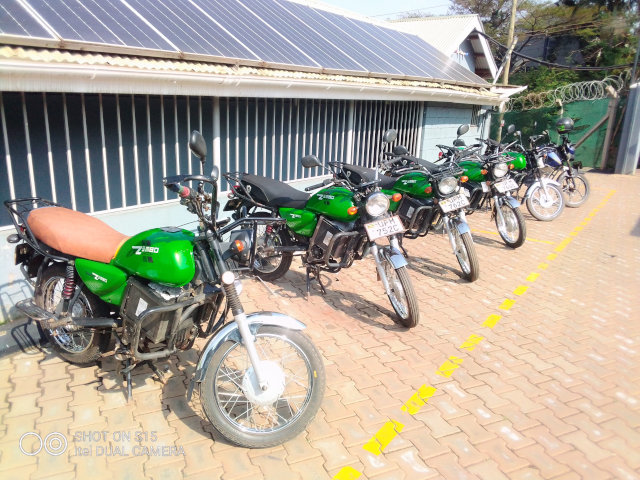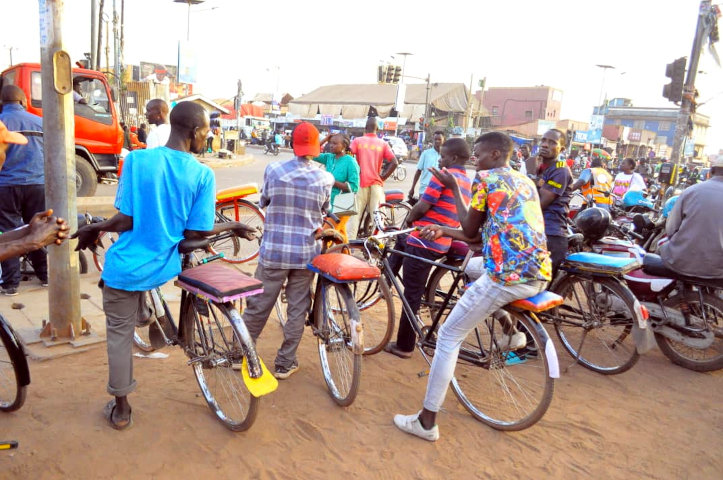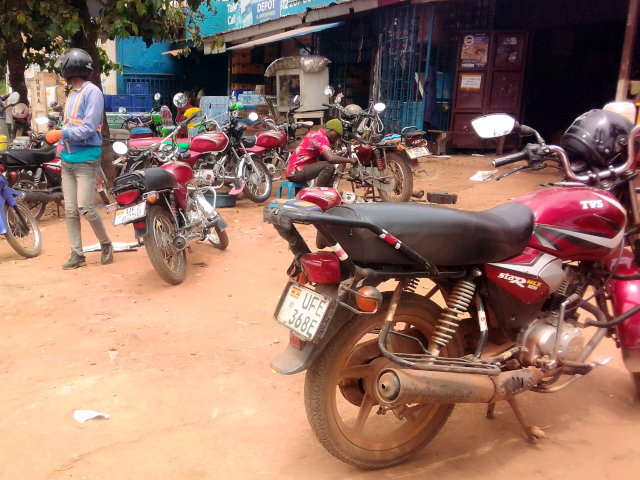Guest Post: Geofrey Ndhogezi is a Ugandan road safety activist, an e-mobility enthusiast, and a consultant on bodas – motorcycle taxis. His work collaborating with research groups on the impact of electric motorcycle taxis.
Mobility is a major enabler of employment, an accelerator of business operations, and a key catalyst for innovation. As people move around — depending on where they want to go, how fast they wish to get there, what they carry along the way, and all other desires — gaps are exposed. To fill the gaps, the specific desires expressed by the moving individuals attract specific travel aids.
So we end up getting help in the form of porters, cart operators, bicycles, motorcycles, tuk-tuks, cars, boats, airplanes and others. Quite often, the travel modes are interconnected in such a way that on a single journey, an individual may need at least two travel modes – if not all of them.

Photo: Geofrey Ndhogezi
Transport regulation, which mainly targets large transport modes, especially in the global South, allows for a huge room for anyone to join or leave transport jobs whenever they wish, and use whichever unregulated vehicle available to them, to offer transport services to whoever is willing. As a result, most transport providers operate without following any specific rules. The absence of regulatory systems and processes in these transport operations enables a certain level of convenience that users would not wish to lose. This helps explain the high rate of growth of what is now known as informal transportation, especially in the global South. As well, it highlights the potential of informal transport in the fight against climate change.
Positioning Informal Transport in Climate Action
While the world continues to grapple with climate change, it’s appropriate to address all greenhouse gas (GHG) sources and informal transportation is no exception. The rapid growth of informal transportation, which means a continuous increase in the number of fossil-fueled, under-regulated vehicles all over the global South, poses setbacks in the fight against climate change if it is continuously neglected. However, if harnessed, the growing numbers could still be a great win.
In my country of Uganda, for example, more than 90 percent of trips are done by informal means. Across Africa, the situation is not so different. Amidst regulatory threats such as banning boda-bodas in some cities, the informal mode of transport unceasingly grows. Which is a clear indicator that the masses are not yet ready to part with informal transportation. They will continue to walk, cycle, and operate carts. And of course those are climate friendly actions. But they will also continue to operate the non-climate-friendly vehicles such as motorcycles, tuk-tuks, trucks, mini-buses, and buses in various capacities. Guiding them towards the transition to clean mobility is key, but should be guided by policy. Currently informal operators are guided by largely unregulated supply and demand, and the status-quo economics of gasoline-powered transportation. Allowing these market forces to guide the future of mobility will delay, or prevent entirely, the transition to e-mobility.

Photo: Kalungi James/Lubyanza
It is widely known that informal transportation has long been on the sidelines of policy discussions. Until this is resolved, ongoing climate-friendly developments may not benefit informal transport dominated areas. There’s a need for inclusive transport policy discussions.
Issues Warranting Policy Attention:
Recognition
Informal transport operators deserve lawful existence as the key to inclusion in national strategic plans. Without this, all other developments involving informal transport may contradict the regulations and cause confusion. Thereby negating the possible benefits.
In Kampala, for example, there have been several attempts to ban motorcycle taxis. Yet at the same time local authorities are directly involved in promoting e-mobility and encouraging the transition from conventional to electric motorcycles. According to Daniel Dreher, co-founder of Zembo an electric motorcycle startup in Kampala, there are no swap stations in the Kampala central business district “because that area was demarcated as a no-go zone for bodas.”
Yet the bodas continue to thrive in the city center and don’t seem to stop any time soon. With inclusive policy arrangements, we would instead see the authorities, e-mobility startups, and other stakeholders joining hands to develop e-mobility-friendly infrastructure everywhere across the city. This would accelerate the transition and reduce the GHG emissions.
Affordability
For informal transport operators, the battery swap business model is reliable and swap fees are cheaper compared to fuel, at least in Kampala. However, the cost of the electric motorcycles is so high. Policy interventions such as subsidization, conventional-electric bike swap, taxi wavers, and others could help reduce the adoption costs.
Access to Spare Parts and General Maintenance
Many of the parts of the electric vehicles are exotic – custom made, or difficult to source, unfamiliar to the majority of local mechanics, and they require specialized care. This often requires the operators to seek help from the very limited providers – the startups, who are also just trying to develop their supply chain and training their small staff on how to handle the various mechanical issues. Policy guided supply chain systems, standards, and training could go a long way. Government funded training would be incredible.

Photo: Geofrey Ndhogezi
End of Life Management for the Batteries
As more people adopt e-mobility, accumulation and disposal of faulty batteries will be a critical issue requiring predetermined policy guides and processes that can enable battery-related policy updates. Making sure the climate, the handlers, and the users are not endangered.
Community Engagement
During the previous Lubyanza quarterly survey, in Kampala, one of the questions was about the interviewees’ choice of motorcycle brands and the majority said they couldn’t choose electric motorcycles because they didn’t know how electric motorcycles work. Neither did they know the benefits of the transition to e-mobility. Policy guided sensitisation would help, especially if it requires the authorities, e-mobility companies, and other stakeholders such as grassroot organizations to join hands and sensitize the masses on the benefits of joining e-mobility, training operators on how to use and maintain the EVs, as well as encouraging feedback from the communities concerning the performance of the electric vehicles. This would help in continuous innovation and policy updates.
Multi-Modality Is the Way To Go
Developing reliable public transport networks would encourage more shared mobility services, both formal and informal, and discourage private car ownership. To do this, we need to plan for what we have and improve transport operations among the informal operators. Making them more user friendly. Informal transportation is deeply rooted in the global South, serving in various capacities. It would be a very satisfying integration if the strengths of informal transport harmonize with the reliability of a well-developed public transport network. It would be a win for the climate, and a socially inclusive transportation landscape for the global South.

Pingback: weeklyOSM 710 – weekly – semanario – hebdo – 週刊 – týdeník – Wochennotiz – 주간 – tygodnik
Pingback: weeklyOSM 710 – weekly – semanario – hebdo – 週刊 – týdeník – Wochennotiz – 주간 – tygodnik – DataGene
Pingback: Why Community Power is the Greatest Innovation in Transportation